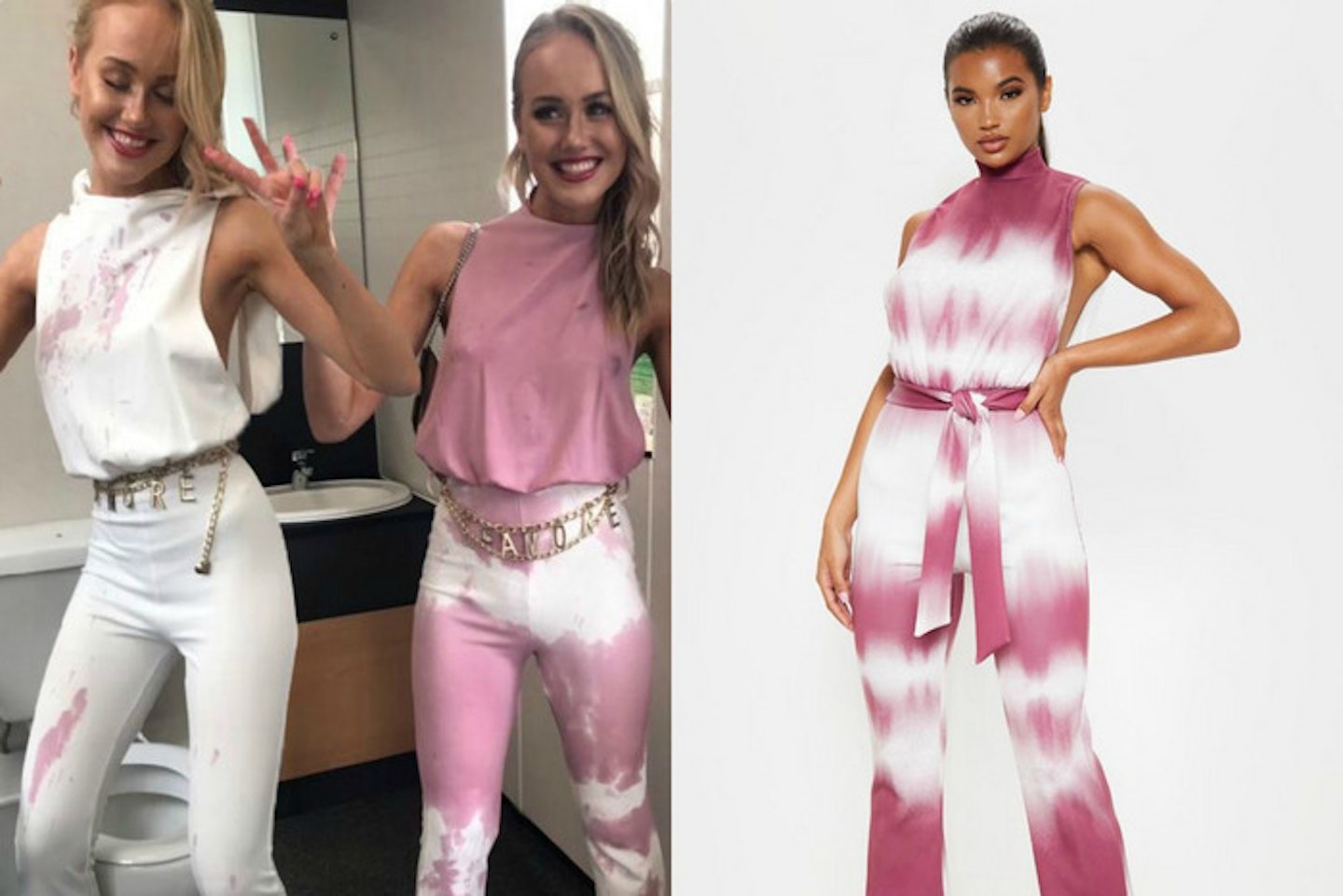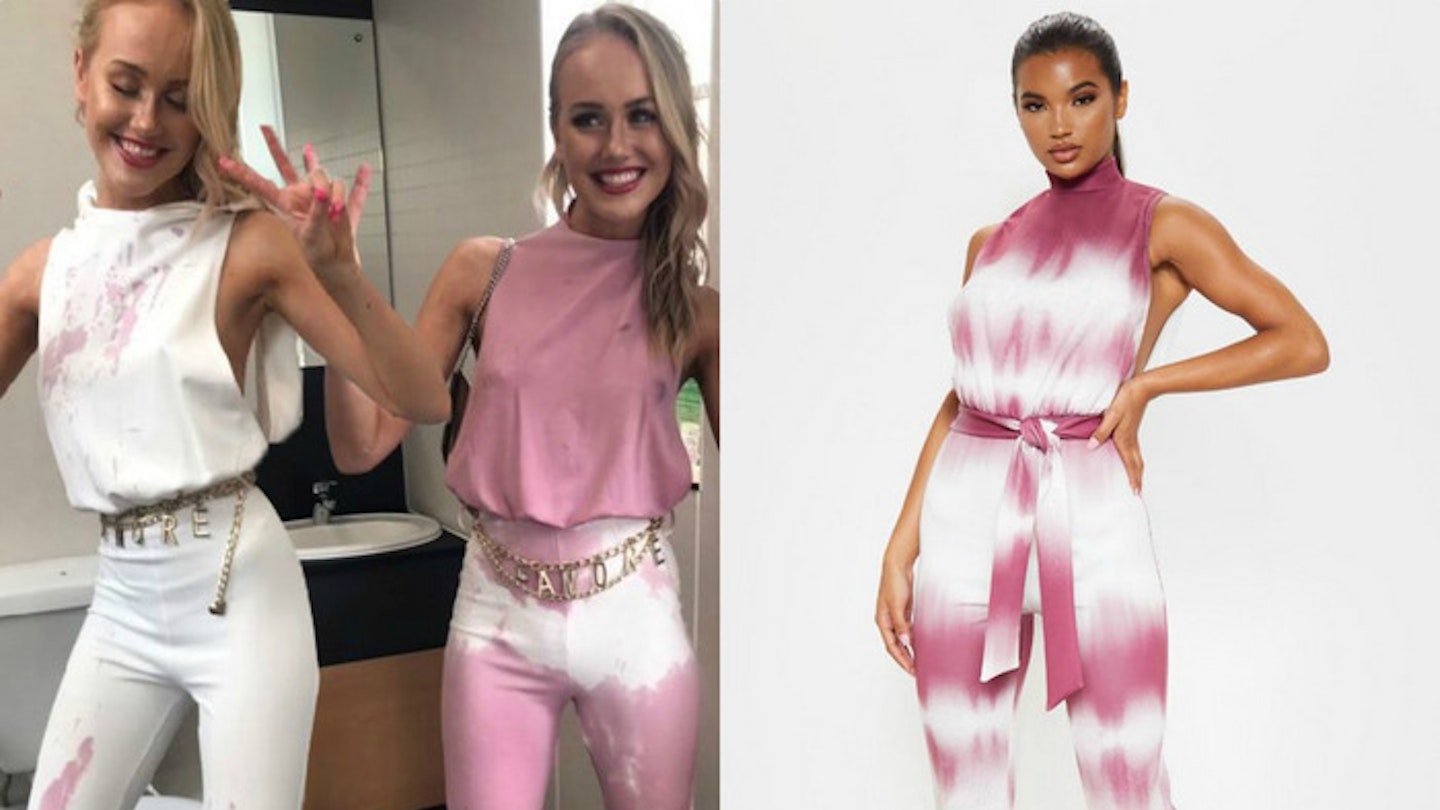Last week, a UK-based woman called Eleanor Walton went viral after solving a red wine-and-white-jumpsuit collision by chucking a further five glasses of red wine wine over the outfit in the toilets, to create a sort of tie dye effect.
In a world where same-day delivery solves our fashion dilemmas, it was an important reminder that you can still fix a wardrobe malfunction (or rogue glass of merlot) with quick-thinking, even more wine and some good old-fashioned up-cycling. And that the results can be way better: because with the help of a hand dryer, the jumpsuit came out looking amazing. In fact, it looked so great that a friend of Eleanor's joked on Twitter that Pretty Little Thing should produce a replica of the new jumpsuit.
And lo, Just five days later a replica of the outfit has appeared on the brand's website for £25 alongside the before-and-after of Eleanor's creation.

Can you spot the problem with this? It shouldn't take long.
As with the £1 bikini and Missguided's replica of that gold Kim K dress (captioned by the brand: 'the devil works hard, but Missguided works harder'), underneath this PR stunt is yet another story which has us all internally screaming 'but what about the sustainability?!'
British shoppers are buying twice as much as they used to a decade ago - which is bad news when it comes to landfills. Meanwhile, brands like Pretty Little Thing have stepped in not just to meet the demand but to actively fuel it. Last year In an open letter to fast fashion brands, Mary Creagh, chair of the Environmental Audit Committee (EAC) said 'People can’t wear the same thing twice, you buy something, wear it once, take a snap and get rid of it. Things have to change.'
When in 2019, Pretty Little Thing was named the fastest-growing fashion retailer in 2017 according to Hitwise data, the chief executive Umar Kamani said 'Our customers are constantly on the lookout for a perfect dress for their next night out and our affordable price tags allow them to achieve regular wardrobe updates – even on the tightest budgets'. By 2018, PLT's sales had increased by 50 per cent.
That's before you even consider the fact that the brand was acquired by Boohoo at the end of 2016. Along with Missguided, at the end of January 2019 it was named the least sustainable fashion brand in the UK in a report by the Environmental Audit Committee.
These brands are racing to meet the pace of trends and capitalizing on some free PR with stunts like the red-wine jumpsuit. But while they do so, £300,000 worth of clothing is buried and burned in the UK every year. Traid - a charity aiming to reduce wasted clothing - has also reported hundreds of thousands of tonnes of clothing ends up in household residual waste every year with 80 per cent going to landfill and 20 per cent being incinerated.
In 2015, the global fashion industry produced 1.2bn tonnes of carbon omissions, totalling more production of greenhouse gasses than international flights and maritime shipping combined. At the same time, MPs campaigning for sustainability are raising concerns that our shopping habits have been radically changed by social media. The fact that viral stories are now inspiring even more consumption (and free advertising) for brands is doing nothing to help that.
Like viral stories, these trends die down in the time it takes for them to be pushed down by a few spots on your Instagram grid. But the impact they leave behind is harder to erase. The message we should be taking from Eleanor Walton's story is that you don't need to throw your clothes away in order to find a different or creative use for them. Rather than buying PLT's £25 jumpsuit (at a considerably greater cost to the environment) we could all benefit from up-cycling and finding different ways to wear the clothes we already own.
